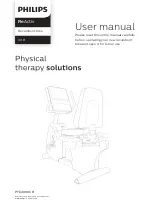
39
Nautilus® Commercial Series Bike Owner’s Manual
throughout the day. Make sure you include your thighs, calves, hamstrings, back, chest, neck and
shoulders.
Do what feels good, but also remember to mix it up. Don’t just do traditional “reach and hold” stretches.
Also, try gently moving through a range of motion that is comfortable to you. For example, you don’t have
to stretch your neck simply by pulling on your head with your hand. You can also just rotate the neck
slowly around and look side to side.
Nutrition
Of course, every good health and fitness program will also include a good nutrition component. Good
nutrition is likely the most important factor in maintaining ideal body weight and managing weight loss.
There are a variety of schools of thought regarding which nutrition program, diet or eating plan is best.
While we do not promote or endorse any particular one, here are some things to consider that will help
you get on the road to a healthy diet:
Understand Caloric balance.
How many Calories you intake, and how many Calories you burn off will
determine whether you will gain or lose weight day to day. It is impossible to achieve weight loss without
some sort of “Caloric deficit” that can be obtained through cutting Calories, or burning off more than you
take in. The wisest approach is to do a little of both – cutting Calories and exercising. It is the only proven
long-term weight management program that is successful. You should ensure that you are consuming at
least 1,200 Calories per day total. A total weight loss of no more than 2 lbs. per week is recommended for
long-term weight management.
Eat a variety of foods.
Regardless of your eating plan, you should be sure to include a variety of foods in
your diet, maximizing your intake of fruits and vegetables whenever possible. Colorful meals and snacks
that are divided amongst the 4 food groups will ensure that you obtain the nutrients needed for your body
to function at optimal levels. Any diet that focuses on just one food group source or processed foods
can be unhealthy in the long run, and should be avoided. Don’t focus too much on any particular meal or
snack, but rather on your overall intake of a variety of different foods during any given day.
Drink water.
Our bodies are made up of over 70% water, and most of us don’t drink enough. Carry water
with you everywhere you go, and drink as often as you can. This helps the body function at optimum
levels, and can significantly help with weight management.
Eat more often and be mindful of your portions.
Research has shown that it can be helpful to eat smaller
meals more often versus 3 larger meals a day if you are looking to promote healthy weight maintenance
or weight loss. And we have discovered that many portions we eat are much larger than necessary, and
can be laden with Calories. So, try snacking more and not eating so many large meals, and share your
snacks or food with others (or break your portions in half) to help manage your Caloric intake.
EXERCISE & FITNESS GUIDELINES












































